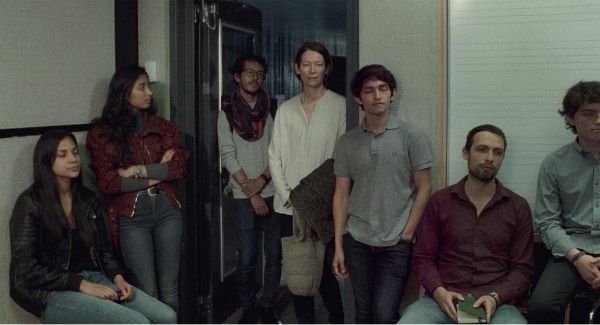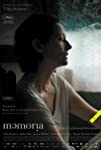Eye For Film >> Movies >> Memoria (2021) Film Review
Memoria
Reviewed by: Nikola Jovic

“Why are you crying, when they’re not your memories?” a question posed near the end of the film, which might as have been directed towards the audience members. What is it of ourselves that we find on those big silver screens when they make us empathise and weep? This is Weerasethakul’s first English (and Spanish) language film, which raised some people’s concerns and expectations as to its authenticity, but just like the lead character of Jessica in the movie itself, Weerasethakul uses this predicament to examine questions such as: what is the experience of being foreign, how is it that we get to label and define experiences. The director of the 2010 Palme d'Or winner, for Uncle Boonmee Who Can Recall His Past Lives, returned to Cannes once again with Memoria, a ruminative slow-burn ride with quite a few bristling jump-scare audial bumps that, in the end, won the Jury prize at last years Cannes, and is now playing in UK cinemas.
Jessica (Tilda Swinton) is a botanist, specialising in orchidology, living as a British foreigner in Columbia where she owns a floral shop in Medellín, visiting her sick sister Karen (Agnes Brekke) at the hospital, as well as her poet husband Juan (Daniel Giménez Cacho), who has a penchant for poetic descriptions of rot and viruses. The film starts pretty slowly (a word which, I’m sure you’re already becoming aware, is going to come up a lot here), just observing Jessica as she is sleeping and then… a ghastly loud bang, waking her up as the audiences are recovering from this unexpected jump-scare . Neither she, nor we are sure what the source of the sound is but we know that she’s the only person able to hear it.
Trying to find the origin of the sound seems to be a dead-end, so Juan points her in the direction of Hernán (Juan Pablo Urrego), a young sound engineer who could at least help her digitally reproduce it. Is it like a concrete ball falling on a metallic plane, surrounded by sea water, or just like the stock sound of a body fall, that you get to buy in sound libraries? Jessica has trouble putting the experience down, but as Hernán is recreating the sound, asking more and more questions and further refining the sound, the film invites us to sharpen our senses and be more present. Hernán was supposed to incorporate the sound into one of the songs of his band, fittingly named Depth of Delusion Ensemble. But when Jessica tries to find Hernán a few days later, it’s as if he never existed. Was he a delusion? This confusion will be abbreviated shortly as Jessica travels to Amazonian forests, where she meets an older man who is also named, or could as well just be another version of, Hernán (Elkin Díaz), slowly getting us ready for the experience that is about to get metaphysical in a typical Weerasethakul fashion.
By now Apichatpong Weerasethakul has crafted a perception of himself and his films that are entirely his own. One can’t be too quick to label his style as a typical representative of slow cinema, as we find it today after Lav Diaz started making films. We can’t include him in a category of transcendental cinema either, with the likes of Ozu or Bresson, since they’re all about withholding devices, and Weerasethakul isn’t exactly all about the slowness but a certain set of subjects he revisits in a kind of metaphysical manner. In that sense, the label Paul Schrader likes to call "post-transcendental film" might be more fitting, but when you look at what company he’s in, it seems like those labels or description don’t seem to offer us any tangible way of communicating what Weerasethakul movie experience is like.
Like the sound in the film, he escapes any signification that would include it all. You could try to run through all the plot points, but even trying to find connective tissues and motivations propelling the story from one scene to the next, you have to exclude certain parts just to make sense of it as a whole. This approach opens the films into something extraordinary indeed. A sound that is a hallucination could reverberate so hard that it activates all nearby car alarms, a panning shot could last for minutes leading to the event of a man falling down as if a bullet had hit him, and a lot more, never to be explained or even acknowledged by the rest of the story. But don’t let this discourage you, because for all the talk of hermetical storytelling, this might be his least hermetic and most approachable movie to date.
Weerasethakul's usual motifs and preoccupations are all here. Partial objects that are half-present, and half somewhere else, like with Jessica’s sister Karen, who falls victim to a disease pretty similar to the one in his film Cemetery Of Splendor (2015), or even the alarm activation mentioned earlier. The motif of the jungle is now juxtaposed with the urban landscape of Bogotá as well. But his biggest and most personal preoccupation is probably the motif of ghosts. And the idea can seem a bit silly, but what ghosts are is indeed an occurrence of a thing partially present. It’s the haunting of the present by something from the past, not allowing us to let go and move on. Viewed through that lens, ghosts are invading our spaces everywhere. What is a piece of music or a film, if not trying to be aware of the present sound or an image, while at the same time comparing that sensation to the one that came before it, and having expectations of what is to come based on that experience? These are all acts that place you out of the immediate reality. The present note or image always being haunted by the one before. And in that sense, memory is another instance of haunting in our everyday life. A way to not be present. A notion Weerasethakul is asking of us to suppress, if not always, but at least during the running time of each of his films.
Reviewed on: 16 Jan 2022

















